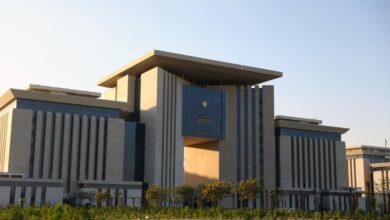
Professor of water resources at Cairo University Nader Nour al-Din, warned “Ethiopia may cause the first water war that will be followed by many wars.”
ّNour al-Din said that, “Ethiopia is mistaken when it thinks that the water reserve in front of its dam, which currently amounts to 42 billion cubic meters, will protect it from any targeting so that Sudan will not be harmed, because there are other means, including partial damage, to reduce the reserve, which can be absorbed in Egypt and Sudan, including targeting the turbines and the flow of water from them. This applies to the international principle of the right to self-defense, life and existence, and I hope that Ethiopia will not cause the first water war in the world to occur, which will be followed by dozens of water wars.”
In statements to RT responding to the Ethiopian chief negotiator’s accusation that Egypt threatens Ethiopia, he accused Ethiopia of publishing an illegal statement, and slammed the Ethiopian chief negotiator’s statement as baseless, ignorant of current global events which recognize the right of states to self-defense.
He continued wondering, “Are there negotiations in the world that last thirteen years without reaching solutions, including eight years since the signing of the Declaration of Principles in 2015 without any progress, during which Ethiopia resorts to procrastination and prolongation with the principle of negotiations that never end, work on the dam that does not stop, and the imposition of a fait accompli policy?”
He noted that: “Egypt and Sudan are accustomed to the Blue Nile on which the giant Ethiopian dam is built sharing about 50 billion cubic meters of water annually, which is what the United Nations (UN) River Water Law calls acquired rights,” he explained.
“Egypt and Sudan are accustomed to reaching over thousands of years and through natural flow to the river without interference from anyone, which Ethiopia changed by constructing its huge dam in violation of international law, changing the nature of the river’s flows and made itself the source and mouth of an international, cross-border river and forgot that it had partners in the river,” he added.
The UN law also stipulates that the new dam should maintain the operation of previous dams and not harm them, which Ethiopia violated by not conducting studies on preventing damage to the Roseires, Sennar and Meroe dams in Sudan and the Aswan High Dam in Egypt.
It also violated the law through causing significant harm to the river’s partners and not preserving their rights regarding river water acquisition.
He added that, “The same international law stipulates a fair and just division of the river’s waters, and Ethiopia wants to convert it to an equal yet not fair division of the river’s waters, as fairness takes into account the presence of other sources of water in one country and their lack of availability in another country. Ethiopia has 12 rivers with dozens of tributaries, while Egypt does not except for a single river with no tributaries.”
“Ethiopia also has Lake Tana, from which the Blue Nile originates, with a capacity of 35 billion cubic meters. It possesses 936 billion cubic meters of rainfall annually, giving it 100 million heads of livestock compared to six million heads in Egypt. It cultivates 35 million hectares of agricultural land compared to 3.5 million heads of livestock and one million hectares in Egypt. It imports only a small amount of its food, while Egypt imports about 65 percent of its food, exposing it to global food crises periodically,” he said.
“The per capita share of water in Ethiopia is three times that of Egypt. Ethiopia refuses to guarantee a minimum amount of water discharged from the Blue Nile for both Egypt and Sudan, not much less than what they were accustomed to receiving before the dam. Ethiopia also refuses to guarantee the operation of all turbines.”
“The thirteen dams are at international rates to ensure that quantities approaching their previous levels reach Egypt and Sudan. Ethiopia also refuses to sign any agreement with Egypt and Sudan regarding water because it intends to confiscate the entire river’s water by building four upcoming dams on the river that deprives Egypt and Sudan of their right to water and to life, meaning that water abundance covets the little water that leads to a state of water poverty,” he stated.
The Ethiopian Ministry of Foreign Affairs quoted the chief negotiator in the Grand Ethiopian Renaissance Dam (GERD), Seleshi Bakle, as saying in a press briefing regarding the results of the fourth round of tripartite negotiations between Ethiopia, Egypt and Sudan, that his country “is committed to addressing the outstanding issues and reaching an amicable solution for the use of the Nile water resources, guided by the principle of use.”
He assured his country remains “fair and reasonable” without causing significant harm to the downstream countries – in reference to Egypt and Sudan.
Bakli, however, accused Egypt of insisting on “protecting unacceptable colonial-era agreements,” and added that Ethiopia maintained “its position of taking into consideration the interests of all countries that would help achieve cooperation and common prosperity for the region.
He explained that the construction of the GERD is now at 94 percent, with concrete construction of the dam scheduled to be completed next September.




